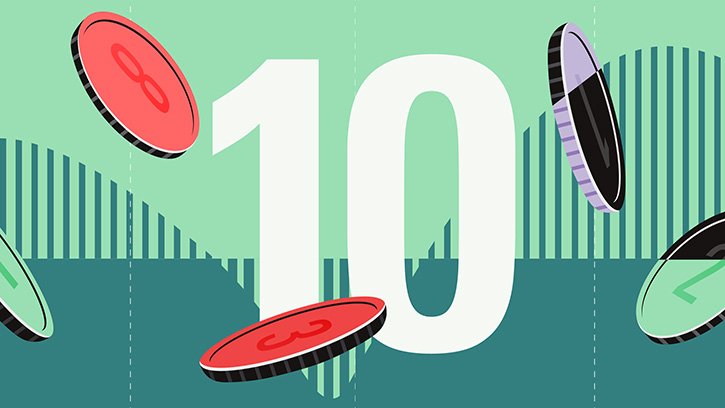Rolle im Portfolio
The iShares MSCI EMU UCITS ETF offers broad-basket equity exposure to large and mid-cap companies domiciled within the European Monetary Union (EMU). Due to its broad sector and geographic equity exposure, this ETF can be utilised as a core holding in a diversified portfolio. The exclusion of non-EMU stocks from the benchmark index – most prominently UK and Swiss stocks - increases its sector concentration compared to broader European indices such as the STOXX Europe 600. More specifically, the MSCI EMU overweights consumer cyclicals, technology, and utilities and underweights consumer defensives and healthcare compared to the STOXX Europe 600. Despite these differences in country and sector exposure, the two indices have maintained nearly perfect positive correlation over the past 10 years (96% to 99%). Over the same timeframe, the MSCI EMU index has also exhibited a high historical correlation (82% to 85%) with the MSCI World NR index, which reflects the multinational nature of the business lines of many of the companies making the index. With this in mind, this ETF is unlikely to provide dramatic diversification benefits when added to wider global stock exposure.
Fundamentale Analyse
Following years of uncertainty and market stress, the Eurozone is showing signs of recovery. After six consecutive quarters of output falls, GDP has linked three consecutive quarters of mild growth out to end 2013. However, year-on-year real GDP growth in 2013 was still negative, lagging the USA, Japan and the United Kingdom who all registered growth over the same period. The road to recovery has been slow, but recently released figures show growth in retail trade volumes and industrial production in 2013, with the beleaguered periphery also reporting positive readings. Aided by active monetary support from the European Central Bank (ECB), fears of a Eurozone break-up following the severe market tensions experienced in 2011 and 2012 have receded. The Bank has cut short–term rates to a historically low 0.25%, while explicitly signalling its intention to maintain, or even lower, these for an “extended period of time”. This is entirely dependent on the outlook for price stability, which remains the ECB’s one and only policy objective. However, with inflation levels hovering well below target, and deflation a credible outcome, it is unlikely that rates will be raised anytime soon. As part of its focus on financial stability, the ECB also routinely provides ample liquidity at very favourable terms to the Eurozone banking sector. This, coupled with low lending rates across the developed world and rising investor confidence, has fuelled impressive stock market gains. The MSCI EMU NR Index, for example, has delivered an annualised return of 15% over the past five years. Almost a quarter of the reference index exposure comes from the European financial sector. Financials occupy the riskier end of the equity risk/return spectrum, and exhibit high levels of volatility when compared with the broader equity market. Since 1999, the MSCI Europe Financials Net Return Index has exhibited a significantly larger standard deviation (27%) than its parent the MSCI Europe Net Return Index (16%). The regulatory shake-up and related restructuring within the banking sector following the crash of 2008 has contributed to the sector’s relatively muted recovery. Financial institutions have been undertaking the painful and costly task of deleveraging and increasing the quality and quantity of their capital holdings in accordance with Basel III, which is currently in its implementation stage. Concurrently, 124 European banks have been working with the ECB and the European Banking Authority (EBA) to conduct asset quality reviews prior to extensive stress tests scheduled to be run from 2014 to 2016. Further regulation, in the form of the European Commission’s proposed financial transaction tax, or changes to trade valuation procedures suggested by the Basel Committee, if implemented could significantly impact formerly profitable businesses such as proprietary trading. Consequently, the European banking landscape remains deeply uncertain, with so many of the finer details yet to be finalised, the impact of these regulatory measures is yet to be fully understood.
Indexkonstruktion
The MSCI EMU index includes approximately 85% of the free-float adjusted market capitalisation of all publicly-traded companies from European Monetary Union countries. Components must meet minimum criteria for liquidity, foreign ownership, as well as a waiting period for newly-listed stocks. Eligible securities are weighed by free-float adjusted market capitalisation. Because closely held firms will have a smaller share of their aggregate market capitalisation floated on public exchanges, the free-float adjustment serves to ensure that the underlying liquidity of the holdings is superior relative to a pure market capitalisation weighting. The index is reviewed quarterly, with May and November semi-annual reviews tending to be more comprehensive than those undertaken in February and August. As of this writing, there are 237 companies included in the index. French and German equities make up between 63% and 65% of the index by value. The top sector weighting is financial services (19% to 21%), followed by industrials (12% to 14%), consumer cyclical (11% to 13%), and consumer defensive (9% to 12%). French oil and gas giant Total S.A and pharmaceutical multi-nationals Sanofi and Bayer are the three largest index constituents, each maintaining around 3% of weighting.
Fondskonstruktion
This ETF physically replicates the performance of the MSCI EMU Net Total Return Index. The ETF reinvests all dividends directly into the fund, which aims to minimise tracking error by eliminating any source of cash drag. This fund was acquired as part of iShares’ acquisition of Credit Suisse’s ETF unit in the summer of 2013. Consequently, the fund does not currently engage in securities lending, although iShares is known to be reassessing the situation, and this may change in the future. The fund is domiciled in Ireland and was originally launched in December 2010. Its base currency is Euros.
Gebühren
The iShares MSCI EMU UCITS ETF levies a total expense ratio (TER) equal to 0.33%, which positions it towards the higher end of the 0.25% to 0.35% range charged by rivals offering broad-basket EMU equity exposure. It should be remembered that there are additional, investor-specific costs associated with trading the ETF, such as bid/offer spreads and brokerage commissions, which should be factored into an investment decision. There are also rebalancing costs whenever the index changes composition.
Alternativen
There is currently a plethora of options available to those wishing to invest in broad-basket European equity. When selecting the appropriate product, investors should consider their dividend and replication preference, as well as their desired geographic exposure. Investors hoping to receive an income from dividends may wish to consider the Amundi MSCI EMU UCITS ETF (TER 0.25%). This ETF offers swap-based exposure to the same reference index, but gives investors the choice between accumulating and dividend distributing exposure. Investors seeking a broader exposure to European equity markets can look at ETFs tracking European large cap indices such as the MSCI Europe and the STOXX Europe 600. All major providers offer funds that track the MSCI Europe at TERs ranging from 0.25% to 0.35%. Investors preferring the STOXX Europe 600 index could consider the iShares STOXX Europe 600 with a TER of 0.21%. This fund has by far the most assets under management of any ETF tracking the STOXX Europe 600 index.
Die in diesem Artikel enthaltenen Informationen dienen ausschließlich zu Bildungs- und Informationszwecken. Sie sind weder als Aufforderung noch als Anreiz zum Kauf oder Verkauf eines Wertpapiers oder Finanzinstruments zu verstehen. Die in diesem Artikel enthaltenen Informationen sollten nicht als alleinige Quelle für Anlageentscheidungen verwendet werden.

















